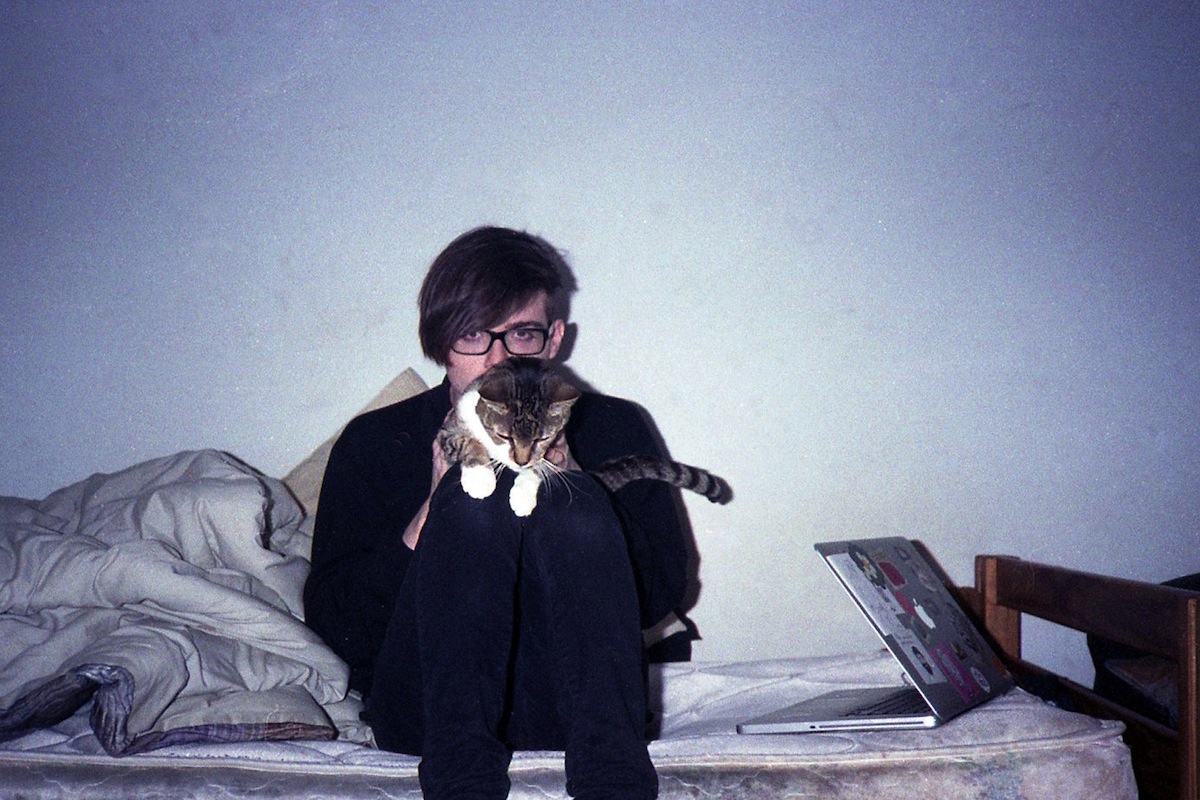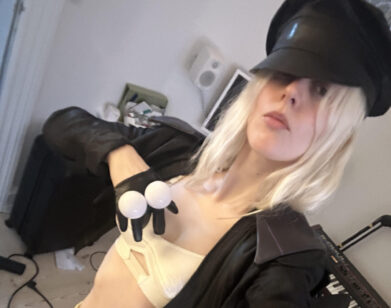Free Range Acid

ABOVE: SAM RAY, AKA RICKY EAT ACID
Sam Ray doesn’t do acid. His music doesn’t even approximate the drug. Ricky Eat Acid, the name of the 22-year-old songwriter’s electronic solo project, links back to subtler things: driving all night with his best friend through long stretches of the Southeast made alien by sleeplessness and euphoria.
2013 marked a watershed year for Ray’s new lo-fi pop band Julia Brown, which toured, played CMJ, and released a debut tape to critical acclaim. But it’s 2014 that will see the release of his official debut as Ricky Eat Acid, a warm, melancholic sprawl of ramshackle beats and ghostly piano. Due January 21 from the Brooklyn microlabel Orchid Tapes, Three Love Songs poignantly curls into moments of death, loss, and other heartbreak. It’s a quiet record, a grower, and a beautiful counterweight to the broad strokes of Julia Brown and Ray’s now-defunct pop-punk outfit Teen Suicide. We called Ray at his home in Baltimore, Maryland to speak about his composition process, the long, long titles he winds around his songs, and his explicit commitment to release all his music for free online.
SASHA GEFFEN: You’ve released a massive catalog of songs on Bandcamp, but you’re calling Three Love Songs your debut. What makes this the first official Ricky Eat Acid record?
SAM RAY: This is the first time I’ve really thought about working on an album. I wanted to put together different styles that I’ve played around with or loved for a long time and never explored. I wanted a cohesive, thought-out piece. It’s very much a record, or my idea of one. Getting to do a limited run 12-inch with Orchid Tapes is really nice. It cements it as the debut because it’s the first physical record. I’m still going to put it up as a free download, but I’ll definitely do it a lot less unceremoniously than I have before.
GEFFEN: I would call this electronic music, but it feels organic. How much of the album was composed on an instrument, and how much was digitally assembled?
RAY: A lot of the stuff that sounds like it was composed isn’t, and a lot of the stuff that might sound like it was made on my computer is not at all. I’ll take a song on piano that I love and I will isolate one note, one chord, and then try to turn it into something unrecognizable from its source. It’s not necessarily even sampling in my mind at that point. I had my friend Caroline, who’s in Julia Brown with me, come over because I wanted strings on “Outside Your House.” She warmed up and then I was like, “All right, you don’t have to play anything else.” I just took everything we had and cut it up slowly and meticulously. It is composed, but not with a melody in mind, not in a traditional way.
GEFFEN: You have this sample on “In Rural Virginia” of a preacher yelling about an angry God. That’s one of the record’s most engaging moments for me. How did you find that sample?
RAY: That was actually the last song I wrote for the album. I was at my friend’s house and we were hanging out in his room late at night. I think we were listening to Thee Silver Mount Zion, something grandiose and heartbreaking. He was telling me about how one of his friends had at one point in his life tried to kill himself to the song we were listening to. I knew right then that my album wasn’t done. That’s probably really dark, but I didn’t have anything that grand on it. It was a lot of little quiet moments and occasional bursts. I wanted one song that was really unsettling. I went on a short tour with Julia Brown and the last date we played was in Richmond, Virginia. I ended up driving around with one of my friends. We had an AM channel playing and all of a sudden, that voice started coming through. It was a local station playing this very angry sermon about a very vengeful God. I put my tape player on the dashboard of my car and recorded about 45 minutes. You hear tons of exterior noise at times. There’s a backpack unzipping, there’s a turn signal, there’s all this stuff that I didn’t try and hide. It’s there, but it doesn’t matter. What matters is that voice that’s ever-present even when you can’t hear it.
GEFFEN: You really pick out the musicality in his voice.
RAY: I did everything with the voice first, and then wrote the song around it. I love doing that. I never get to. I don’t like to use recognizable samples when I can avoid it. I have this overwhelming fear of being incredibly clichéd in my choices. I never want to look back in 10 years and think, “Oh man, I was such a child.” And I know I’m going to. It’s pretty unavoidable, but you can try.
GEFFEN: The songs have these long, elegant titles. Did you already have them in mind when you wrote the music?
RAY: A lot of them, yeah. “Driving Alone Past Roadwork” was a song I’d wanted to write for two years since I’d always be driving alone past roadwork at night. I tried to figure out, how do I get this weird feeling that I can’t explain to people into a song? “Big Man’s Last Trip Outside” is just, my cat died, and that was his name. The day before he died, he went outside. He’d been too sick to go out. It was March, it was a beautiful day, and we lost him. We couldn’t find him. I was pretty sure I was going to find him dead somewhere, but he turned up under a bush. I was looking for him and there was light coming through all the trees. I was thinking, “He’s probably never going to go outside again.” He didn’t. I was working on that song the day he died, and I wanted to mess with the idea of what it felt like looking for him but also what it might have been like for him going out. “God Puts Us All in the Swimming Pool” is just about the Sims. Not everything has a deeper meaning.
GEFFEN: You’ve had a pretty big year with Julia Brown. How is your process different when you’re writing with a band than when you’re composing by yourself?
RAY: Oddly, it’s not all that different. The Julia Brown album we’re writing and this Ricky Eat Acid album coming out are two very different projects, but the albums themselves are kind of companion pieces. They share a lot of elements, pieces of music between them, lyrics that recur, themes. I guess the biggest thing is I’ll get very excited about whatever I’m working on and I’ll just want to get it done. The band’s there to tell me, “Wait, no, we could finish this today but we could wait and it would be a lot better,” and they’re always right.
GEFFEN: You mentioned that you’re going to share this album on Bandcamp. Will you keep sharing your music for free, or do you think you might shift to a more traditional model?
RAY: I’m actually building a website to go around Bandcamp, because they only give you so many free downloads. I’m trying to make it so that everyone can get this record for free. I’m still going to keep the option to donate. If you want to pay money for music, that’s awesome. I can’t. I’ve never been able to afford to. Right now I want to keep everything available. If someone wants the album and they can’t afford it I think it’s stupid to tell them, “Well, that sucks, you have to come up with the money.” That’s a really outdated way to look at it. I don’t have any plan to perpetuate that. If someone likes my music, that’s awesome. I don’t want to treat them as someone that should give me money for it. That’s cool if you like it. Here it is. Thank you.
GEFFEN: I’ve got to ask: is there a story behind the name of the project?
RAY: Yeah, there is. My friend Ricky and I are best friends. We were at a party a couple weeks after I graduated from high school and he got a call from one of his friends who had acid. I don’t do acid. Everyone thinks I do because of the name. Ricky’s like, “I’ve never done acid. Do you want to drive my car around while I trip?” I was like, “Yeah, that sounds really fun, let’s do that.” So we had this weird, grand adventure. We never went to sleep. I went to sleep 48 hours later, and I didn’t even do acid. We ended up driving his car onto a big hill and watching the sun come up. Anyway, I left a note for my mom so she would know where I was, but I wrote it really stupidly. It just said, “Ricky eat acid.” It’s a goofy origin story, but it’s got a lot of positive associations.
GEFFEN: It’s kind of fitting. A lot of your music seems to come from driving around in weird states.
RAY: It definitely ties in. I don’t think it’s ever been that ill fitting. It’s not a serious name, but with an album I’m taking seriously, I still don’t feel odd about using it. I have no need to change it to anything more dramatic. I’ve always wanted to make a mockery of myself for my own amusement. But the music is still very dear to me.
THREE LOVE SONGS IS OUT JANUARY 21 FROM ORCHID TAPES. FOR MORE ON RICKY EAT ACID, PLEASE VISIT THE ARTIST’S FACEBOOK PAGE.






